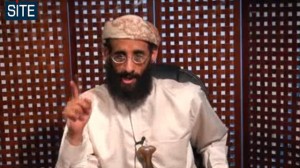
In this image taken from video and released by SITE Intelligence Group on Monday, Nov. 8, 2010, Anwar al-Awlaki speaks in a video message posted on radical websites. Al-Awlaki is one of three US citizens known to have been killed by American drone strikes.
A Justice Department white paper leaked to NBC News and reported on Monday sets out what administration attorneys believe is the legal case for drone strikes targeting American citizens — arguments that until now have not been fully revealed to the public.
In a New York Times op-ed piece last month, Vicki Divoll, a former general counsel for the Senate Select Committee on Intelligence and a recent guest on Moyers & Company, demanded that President Obama release documents detailing his legal argument for targeting and killing American citizens. We checked in with Divoll for some analysis of the newly leaked Justice memo.
Lauren Feeney: What are your initial thoughts after reading through the 16-page document?
Vicki Divoll: It’s going to take some time to sort through it. We need to step back and read the Supreme Court decisions referred to in the memo more carefully. But the thing that I found new and interesting is the discussion of the constitutional questions — the Fifth and Fourth Amendment questions.
Their Fifth Amendment due process argument relies heavily on a 2004 Supreme Court case known as Hamdi v. Rumsfeld. Mr. Hamdi was a United States citizen picked up on the battlefield in Afghanistan who ended up in a military prison in Virginia. He filed a habeas petition that made it all the way to the Supreme Court arguing that he was entitled to some due process rights. The government argued that Hamdi did not have rights in this situation, as a detained enemy combatant, but the Court disagreed and concluded that he did have some level of due process rights. He was detained by his government and he had the right to be heard before an impartial factfinder. Shortly after the decision Mr. Hamdi was released. So the administration is now making the same argument again against due process rights for the individual, and relying on a 2004 case in which the court ruled against them the last time around.
What the Court did do in Hamdi is balance the rights of the individual that are being taken away versus the interests of the government to be able to act. In the newly released memo, the government is applying this balancing test itself and concluding that the Court would come out on their side this time — that the individual does not have due process rights here. To rely on a case in which the Supreme Court held that the due process rights of the so-called enemy combatant were paramount, and then just rebalance it yourself with the facts before you now is very odd from a legal analysis point of view, and very dangerous.
Feeney: Let me make sure I understand. The memo argues that it’s lawful to kill an American citizen if the person poses “an imminent threat” and his capture is infeasible. So if you take the Hamdi case, but instead of having an enemy combatant in detention, you have one whose capture is unfeasible, the memo is arguing that in that case the Supreme Court would rule in the government’s favor?
Divoll: Yes. They’re saying that when you look at the current situation, and apply the balancing test that the court relied on in Hamdi, they’re speculating that the court would agree with their version of the balancing this time around. But Hamdi was an eight to one plurality opinion — eight of the nine justices agreed with Mr. Hamdi and not with the Bush administration. And the language was very striking — Justice O’Connor’s opinion talks about too much power in the executive and reminds us that war is not a blank check for the executive to take away the rights of U.S. citizens. Those kinds of ideas are all throughout the decision that the current administration is now relying on to support its point of view that the executive may act unchecked in this situation. Bold of them, I think.
Feeney: It doesn’t sound like you think they have a legally sound argument here.
Divoll: No, I don’t think that their Fifth Amendment argument is solid. But I think this is the best they can do, and that they would make this argument if they were before the Supreme Court tomorrow — and I personally think they would lose. But the real problem is, they’re not going to be before the Supreme Court tomorrow, or maybe ever. The courts haven’t been able to review and resolve this issue because of the limitations on the power of the courts, and because the Obama administration has gone to great lengths to keep it from the courts. So we’re probably not going to get to see what the nine justices would say about this, at least not any time soon.
Feeney: What’s their Fourth Amendment argument?
Divoll: The cases they relied on to argue that killing a U.S. citizen abroad was not in violation of the Fourth Amendment are high-speed chase cases in the domestic law enforcement context. So, essentially, the government uses the war model when they want to talk about enemy combatants in the Fifth Amendment context, laws of war, presidential power in war — but when they get to the Fourth Amendment, all of a sudden they are talking about police officers chasing suspects down Main Street. They choose whatever context they think makes the argument better under their different constitutional theories. I don’t think they can have their cake and eat it too — either it is war or law enforcement, not both.
Feeney: How does the Justice Department define “imminent threat”?
Divoll: The word imminence is such a slippery slope, and it’s been used so many times in so many different ways. The Bush administration did this in the lead-up to the Iraq war — it defined imminence to mean ‘our intelligence tells us they have weapons of mass destruction.’ Putting aside the fact that the intelligence turned out to be wrong — the fact of having weapons of mass destruction doesn’t mean you’re about to use them. Many people argued then and now that the imminence standard was not satisfied in the choice of going to war in that case.
Same here — how imminent was the threat? Frankly, I do not understand their theories of imminence in the white paper. They talk about it one way in one part of the memo and other ways in other parts. I need to try to sort it out, to be honest. It does seem, however, that “imminence” does not require the executive to have compelling information that an attack is in the planning stages. That is new, and pretty alarming.
Feeney: Another phrase that struck me as vague is “undue risk.” The memo says that capture must be unfeasible or pose an undue risk. But once you have the possibility of using unmanned drones, couldn’t you claim that any risk is undue by comparison?
Divoll: From a moral point of view, that’s actually one of their stronger arguments. Once you’ve crossed the threshold and concluded that this person is a proper target, using a tactic — and drones are really just a tactic — that protects your own forces from loss of life is a moral imperative. I don’t have any problem with that. But, of course, we’re talking about drones because this is the method that we know they’re using to kill people. The legal analysis is the same no matter how you conduct the targeted killing, whether you’re using drones or some other tactic. We don’t know if they are killing people, including Americans, outside of war zones using other tactics than drones.
Feeney: Is there anything the Justice Department could have said that would make you say ‘well, there’s a sound argument?’ Can you imagine a legal justification for the targeting of American citizens that would pass muster in your mind?
Divoll: I think they probably did the best they could with the available law. What’s stunning about the argument is that the available law is either skimpy, not there at all, or needs to be distorted to fit the facts in this case.
That’s the problem with the administration’s lawyers making this call. The president is conducting this program — ‘Is it lawful?’ he asks his DOJ lawyers. The incentive to say yes is enormous. Is a 32-year-old lawyer going to say ‘No, you better end this program because of Hamdi?’ It’s not human nature. They’ll use their skills to come up with the best argument they can to support the president’s program. This is one of the reasons we need another branch to focus on these issues, and if it can’t be the courts, it must be Congress. I hope Congress steps up.
Feeney: This white paper isn’t actually the full classified legal memorandum that you demanded the administration release in your recent op-ed in the New York Times and that a group of senators demanded on Monday, it’s just the most in-depth explanation that we have so far. Do you think we’ll ever see the classified document?
Divoll: I don’t know. There’s no legal justification for keeping it from Congress. In terms of making it public to the American people, they can argue that it’s classified — they usually say that the legal arguments are interspersed with the facts and the facts are classified. This white paper is an attempt to separate out the legal arguments from the facts on the ground, which I understand. The other argument they make for keeping legal arguments secret is that we don’t want the enemy to know even the legal arguments. Well, fine, if you think that the enemy is comporting its behavior based on our laws. But then the American people don’t get to know the legal arguments either. If you want to talk balancing test, I think the risk of al Qaeda knowing what our Constitution says is outweighed by the benefits of the American people knowing what our Constitution says. Or at least what the president’s lawyers argue our Constitution says.
Feeney: You said in your conversation with Bill last week that you understood that the administration might not be able to release the full legal memo because it would be interspersed with classified information, but that they need to explain their justification for killing American citizens. Does this memo satisfy that?
Divoll: It checks the minimum box. It gives us a lot more detail than we had before about their legal thinking. At this point, I’m ready to move on, stop fighting about memos and start fighting about what’s the right answer here.


